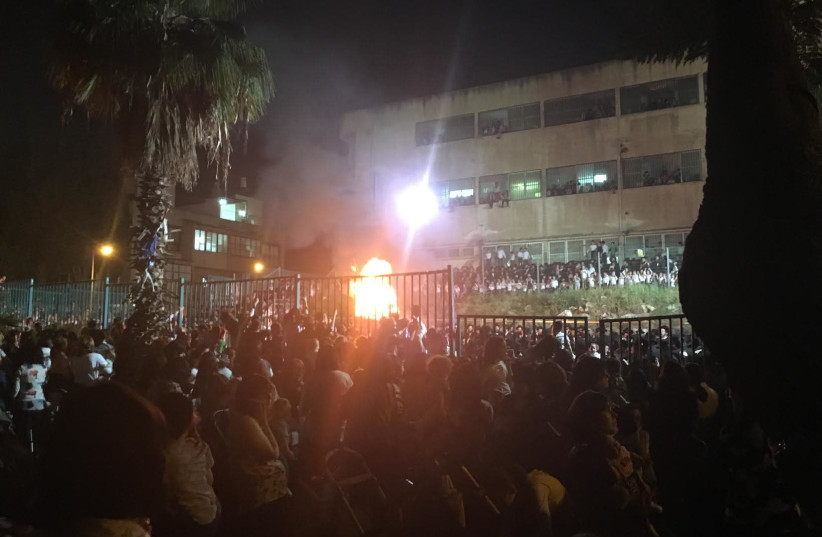In Bnei Brak, hundreds of residents gathered around a fire lit in the middle of Damesek Eliezer Street street. Police arrived on the scene, quickly extinguished the flames and dispersed the crowds.

Hundreds were seen celebrating Lag Ba’Omer with large bonfires in the ultra-Orthodox Mea Shearim neighborhood in Jerusalem on Monday evening.
A video tweeted by Channel 12 News shows crowds singing and dancing while very few people were seen wearing masks or observing basic social distancing guidelines.
בניגוד להנחיות: המוני משתתפים מצטופפים סביב מדורת ל”ג בעומר בשכונת מאה שערים בירושלים, מדורות עם עשרות משתתפים הודלקו במוקדים נוספים >> https://t.co/WKjUSH0LCi@yaircherki @OrRavid pic.twitter.com/2jZWPtI0Mq
— החדשות – N12 (@N12News) May 11, 2020
A spokesperson for the Jerusalem Division of the Israel Police said that “Israeli police dispersed a crowd of a few hundred residents of the Mea Shearim neighborhood in Jerusalem, amid the backdrop of Lag Ba’Omer events, contrary to the Health Ministry’s guidelines.”
Prime Minister Benjamin Netanyahu condemned the bonfires in a statement following the incident, saying that he plans on increasing police enforcement and crowd dispersals after talking to Internal Security Minister Gilad Erdan, Deputy Police Comissioner Motti Cohen, National Security Dept. head Meir Ben Shabbat.
Ben Shabbat was quoted in the statement, warning that “this kind of behavior could bring about an outbreak of disease.”
Another bonfire was lit in Jerusalem’s Zichron Moshe neighborhood, drawing dozens of participants.
In Bnei Brak, hundreds of residents gathered around a fire lit in the middle of Damesek Eliezer Street street. A police force that arrived on the scene immediately extinguished the flames and dispersed the crowds..
Amid the coronavirus outbreak, Israel banned the traditional act of lighting bonfires for the holiday. The only exceptions to the rule were three bonfires which received approval to be lit at the tomb of Rabbi Shimon Bar Yochai in Meron.
But even at the tomb, instead of some 250,000 people gathering there to celebrate the Talmudic sage, only a gathering of some 50 people were allowed at the three different site locations.
This is the third major Jewish holiday this year to be celebrated since the coronavirus outbreak began, after Purim and Passover.
Purim celebrations, which took place in early March, had few limitations placed on them regarding public gatherings, which many credit to exacerbating the spread of coronavirus in the country.
During Passover however, a full lockdown was placed on the country.
Despite the lockdown, President Reuven Rivlin, Prime Minister Benjamin Netanyahu, Yisrael Beytenu head Avigdor Liberman and Likud MK Yoav Galant were all caught breaking social distancing rules and hosting Seders with loved ones, which led many to criticize their inability to lead by example.
Israel’s ultra-Orthodox population has been disproportionately hit by the novel coronavirus, with the cities of Jerusalem and Bnei Brak far outpacing all other Israeli cities in the number of cases confirmed.
The city of Jerusalem has, in past months, placed heavy restrictions and selective lockdowns on Mea Shearim and other ultra-Orthodox neighborhoods in an effort to curb the spread of the virus.
In early April, Haaretz reported that 75% of coronavirus cases in Jerusalem are residents of ultra-Orthodox neighborhoods.
As reported by The Jerusalem Post
